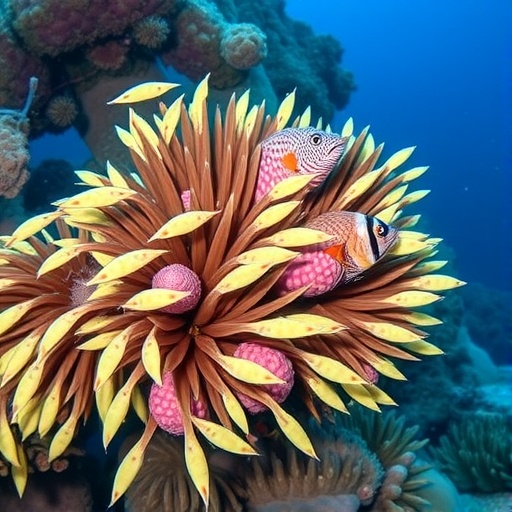Recent research has unveiled significant changes in the structure of deeper Caribbean reef fish communities over a nine-year timeline. This groundbreaking study, led by an accomplished team of scientists, highlights how taxonomic and functional dominance among these aquatic species is evolving in response to various environmental pressures, including climate change and human activity. The implications of these findings are profound for both marine biodiversity and conservation efforts in this vital ecosystem.
The researchers meticulously examined fish communities residing in deeper Caribbean reef environments, focusing on alterations in dominance structure over nearly a decade. Their study unveils a trend suggesting that deeper ecosystems are not insulated from the ramifications of surface-level changes, which have been exacerbated by anthropogenic influences. This comprehensive research draws on a multitude of data sources to underscore the interconnectedness of shallow and deep reef systems, challenging traditional beliefs about ecological resilience.
Key to the study is the assessment of species dominance, which provides insights into community composition and species interactions. The researchers discovered a substantial shift in the prevalence of certain fish species, indicating a potential realignment of ecological roles and the dynamics of predator-prey interactions. As species distributions have changed, so too have the functions they serve within their ecosystems, thus impacting the overall health and stability of the reefs.
An essential component of the research was the evaluation of functional traits among fish species. The functional diversity of an ecosystem is critical for its resilience and capacity to adapt to changing conditions. The study found notable shifts in functional traits, suggesting that as some species diminish or increase in number, the roles they play in the ecosystem could be altered, potentially affecting nutrient cycling and energy flow within reef communities.
Furthermore, this research contributes to a growing body of literature underscoring the importance of deeper reef ecosystems, which have historically received less attention than their shallow-water counterparts. As researchers and conservationists increasingly recognize the significance of these habitats, there is a growing call to prioritize their protection and study. The findings from this study serve as a clarion call for resource managers and policymakers to consider the health of deeper reef ecosystems in their conservation strategies.
The study’s implications extend beyond mere academic interest; they underscore an urgent need for enhanced monitoring and conservation strategies aimed at mitigating the impacts of climate change and fishing pressures. By understanding the intricate dynamics of deeper reef fish communities, stakeholders can better aim their efforts at preserving the biodiversity that underpins these vital ecosystems.
Additionally, the researchers advocate for the integration of socio-ecological frameworks in managing reef systems. Engaging local communities in conservation efforts can yield mutually beneficial outcomes, promoting sustainable practices that safeguard marine life while supporting the livelihoods of those reliant on these resources. This holistic approach is essential for fostering resilience in not only fish populations but the entirety of the marine ecosystem.
The healthcare of coral reefs is intrinsically tied to their associated fish communities. As these communities experience taxonomic and functional shifts, the broader implications for coral health become starkly apparent. Coral reefs, often termed the “rainforests of the sea,” depend on a delicate balance of fish species to maintain their structure and functions. Disruptions in fish communities can lead to coral decline, further threatening these biodiverse ecosystems.
In conclusion, the research conducted by Boon, Keith, Exton, et al., provides critical insights into the changing dynamics of deeper Caribbean reef fish communities. The observation of greater taxonomic and functional change in dominance structure over nine years calls attention to how these changes may signal larger shifts within the ecosystem, with potentially dire consequences. It’s imperative that this research spurs a more rigorous examination of deeper reef environments and informs policies aimed at their protection, ensuring they continue to thrive for generations to come.
The future of Caribbean reef fish communities hangs in the balance, influenced by a complex web of factors from climate change to local fishing practices. It is only through a combination of sustained research, community engagement, and robust conservation strategies that we can hope to understand and mitigate the challenges these ecosystems face. The journey towards improved resilience of these underwater ecosystems requires unwavering commitment and innovative thinking, reinforcing the notion that the health of our oceans is directly linked to our actions on land.
Subject of Research: Changes in Caribbean reef fish communities
Article Title: Deeper Caribbean reef fish communities show greater taxonomic and functional change in dominance structure over a nine-year period.
Article References:
Boon, J.S., Keith, S.A., Exton, D.A. et al. Deeper Caribbean reef fish communities show greater taxonomic and functional change in dominance structure over a nine-year period.
Coral Reefs (2025). https://doi.org/10.1007/s00338-025-02709-7
Image Credits: AI Generated
DOI:
Keywords: Caribbean reef fish communities, taxonomic change, functional change, climate change impacts, ecosystem resilience.




